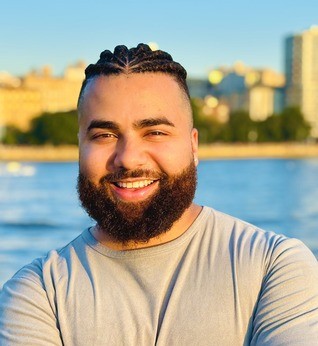Alumnus Profile: AJ Hudson
This profile is the first in a series, published by the EJCJC Network, highlighting Columbia alumni making an impact in the environmental justice space.

To say that A.J. Hudson has accomplished a great deal since graduating from Columbia College in 2013 is an understatement. AJ worked for Teach for America, won a Fulbright teacher exchange in Japan, got a master's at Yale, went to law school at Yale, and is completing his PhD at Oxford. The through line, however, to all his work is a passion for environmental and social justice, a commitment to education that shines a light on injustice, and a desire to leverage his academic credentials to improve the lives of his fellow community members.
AJ found the Columbia community open-minded and liberating and got involved with research, acapella, and campus activism – setting the stage for the advocacy work that continues to define his career. AJ recounts taking advantage of the “Double Magic” of Columbia and New York City, describing his time at Columbia as formative to his personal growth and finding a sense of identity rooted within his broader community. “I got to explore all different sides and aspects of my identity,”' AJ told me. “I really started to find my feet as a queer person of color who wanted to do social justice work.” Despite getting a BA in neuroscience and psychology, AJ says his experiences at Columbia prepared him for his current work – as a scholar-activist in the environmental justice space. At Columbia, AJ’s work-study job was with the Earth Institute’s Center for Research on Environmental Decisions, which he credits for first teaching him that all disciplines can be “environmental” – whether it's neuroscience, statistics, or earth science – they are all needed to tackle climate change.
After graduating from Columbia, AJ signed up for Teach for America and was placed in a high school in Brooklyn. While he enjoyed inspiring his students, AJ described being appalled at the conditions that his students were learning in – from chronically leaking ceilings to water fountains with dangerous levels of lead. AJ began advocating for a new school building and going to school board and community planning meetings. However, nobody took him seriously, dismissing AJ’s concerns because he wasn’t an “expert” in their eyes. Frustration by this lack of agency led AJ to enroll in graduate school to become that expert and to be a more impactful advocate for his community. In this journey to graduate school, AJ faced steep barriers and lacked financial support due to his low-income background. Still, after learning that some research-based master's programs could be funded, AJ accepted an offer to study at the Yale School of the Environment. At Yale, AJ continued his campus activism – successfully pushing to create a Center for Environmental Justice and diversify the faculty more broadly.
Yale was also where AJ started working for UPROSE, a grassroots climate justice organization based in Brooklyn. AJ worked as a “Just Transition advocate” and youth organizer, interacting with the local community and pushing for environmental justice policy. AJ told me that he “fell in love” with the mix of activism and scholarly work he engaged in. “I loved the ability to study things that I really cared about and be a nerd in the academy, but also the ability to dig in and support communities with resources and education,” AJ said in our interview. Despite working on advanced degrees, AJ has remained with UPROSE, serving on their advisory board.
AJ is currently working with UPROSE and other EJ organizations to build the framework for an alternative to COP, the UN climate change conference, for frontline communities whose voices are often ignored. AJ envisions a “people’s COP” where community voices lead the discussion instead of fossil fuel executives and lobbyists who often push carbon-capture technologies. “I’m not interested in the machines that can suck carbon from the air if they’re not also going to suck racism from the air, classism from the air, and sexism from the air because these are the things that are actually at the core of the climate crisis,” AJ said at an UPROSE event examining the complicity of COP during the 2023 Climate Week in New York.
Ultimately, AJ defines his place in the environmental justice movement as a “scholar-activist.” AJ is working on completing his dissertation on climate justice in the Caribbean and, in a full-circle moment, was recently hired by the Pratt Institute to teach environmental psychology. AJ is also working on several publications – he recently wrote a chapter on environmental justice in Puerto Rico, published in Routledge’s new textbook on Environmental Justice.
Despite his many achievements and publications, AJ views himself as a provocateur whose role is to push back against the status quo in the environmental movement. “I really hope to keep doing movement work and partner with UPROSE and other EJ organizations and invest in my community, and really just to keep doing the work pushing towards climate justice,” AJ said.
